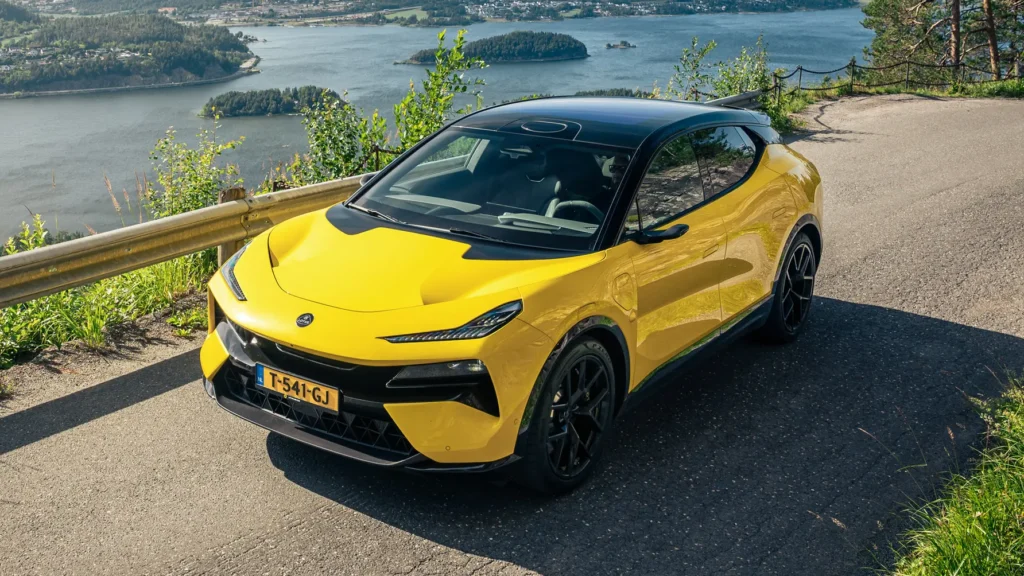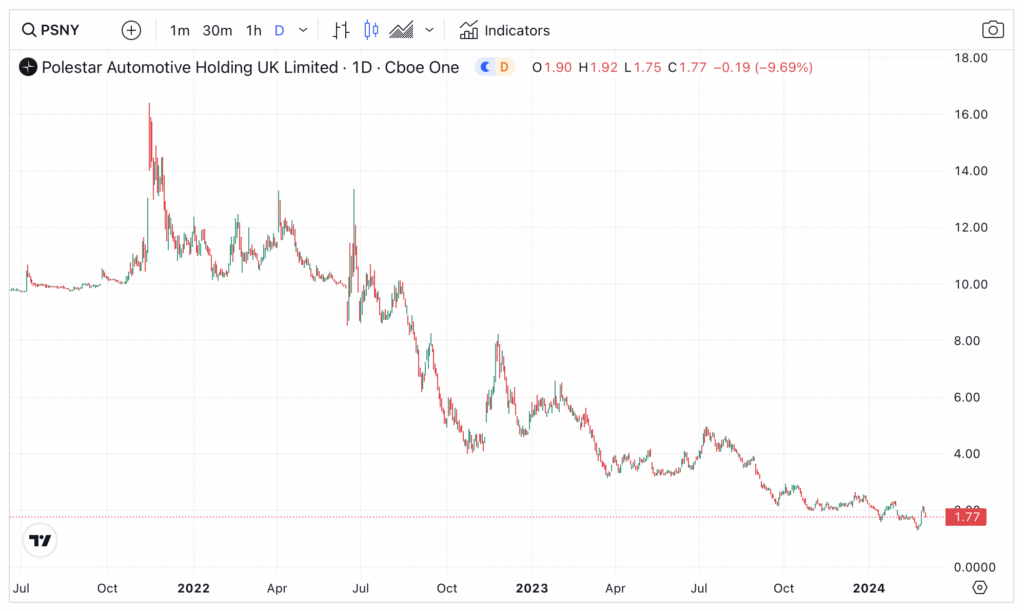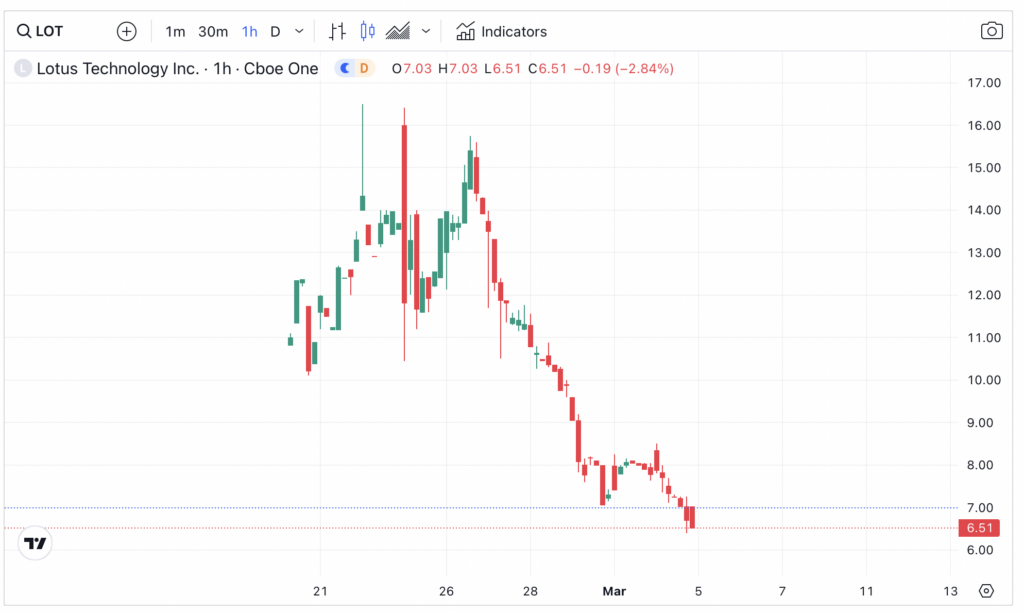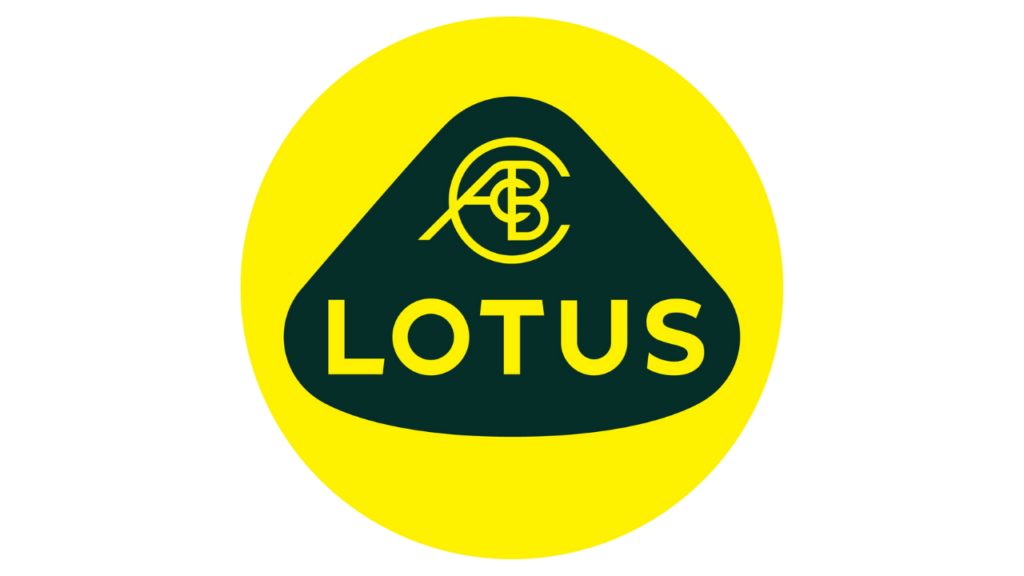Purveyors of sports cars would be familiar with the Lotus brand. Who could, after seeing one on the road, forget the gorgeous Lotus Esprit S1? And, as one Top Gear review noted, the Lotus Elise continues to define the modern Lotus. But, will the Lotus Technology share price perform as well as their cars?
Lotus Technology & Cars History (NAS: LOT)
Unfortunately, like many great British enterprises that failed to adapt to the evolving market, gradually Lotus lost its direction. Then, predictably, it collapsed into financial difficulties. By the mid-nineties, Lotus’ roster of ever-changing owners included General Motors, Toyota, ACBN, and the Malaysia-based Proton. In 2017, the fast-growing Chinese carmaker Geely Automotive (US:GELYF) bought a majority stake in Lotus, hoping to grow its international presence with the Lotus brand. As a side note, Geely also owns Volvo Car.
While the original Lotus company no longer exists, its models survived and has morphed into other forms. Interestingly, under Geely’s direction, Lotus not only charged into the electric sector, it became a listed company.
In early 2023, Lotus Technology (with EV bits from Lotus) and L Catterton Asia Acquisition Corp (LCAA) agreed to merge. LCAA is a 2021-incorporated special purpose acquisition vehicle (abbreviated SPAC) that has a listing in the Nasdaq exchange. SPACs are so-called blank cheque companies (“shell companies”) that absorbed private enterprises into the public markets. Cazoo (CZOO) the online used car seller is an example of British companies that listed in Nasdaq via SPAC called AJAX I.
For Lotus, following the merger with LCAA in early 2024, the group now trades in Nasdaq under the ticker “LOT”. The stock has 695 million shares outstanding, thus, at $6.5 per share, valuing Lotus at a decent $4.5 billion.
Why makes Lotus Technology an interesting investment?
Lotus Tech is an electric vehicle (EV) manufacturer that produces sleek sports cars. The current design of Lotus car derives from the British-made iconic lotus automobiles of the yesteryears, but with added smoothness of modern aerodynamical shapes. Electric SUVs like Eletre are receiving some attention. Sub 5 seconds on 0-60 mph. Other models like Emira are also on the radar. Even Top Gear admires this beautiful car, writing:
Emira is striking and taut. What you don’t get a sense of until you’ve seen one roll down your local high street is just how exotic the shape is. It’s got proper supercar hips and deeply dramatic intakes and vents, expertly collated into a footprint the size of a Cayman, which wouldn’t get a second look.
In other words, Lotus cars are interesting, which piques my interest in the stock. Lotus Tech assembles cars in Wuhan, China, which could improve the reliability of the machines.

Should you buy Lotus Tech shares?
Your immediate reaction is probably, “Not another loss-making EV stock!” This is understandable. Most investors are still underwater from holding Nasdaq EV stocks.
From a once-in-a-generation boom in 2021, the EV sector is now in bust mode. But what exactly is wrong with the EV sector?
First, many glaring obstacles to EV adoption are growing – to the point that even traditional car companies are decelerating their investments into EV car models. From demand to technology to the charging network, the pace of progress is just not moving as fast as people previously envisaged.
Mercedes Benz, for example, scrapped plans to sell EV-only cars by a few years due to weak demand. Apple is ditching its entire multi-billion EV project to concentrate on AI. The entire charging infrastructure network is struggling to earn profits. Many EV carmakers are unprofitable.
Second, EV stocks are no longer the hottest sector of the market. AI investing and crypto are. At the time of writing (March 2), Bitcoin has almost rallied to its all-time highs again near $69,000. In contrast, few EV stocks are trading anywhere near their price peaks.
Even the king of EV – Tesla (TSLA) – is trading at half its 2021 peak. Scores of other EV-related stocks are languishing near their all-time lows. Unless you know the fundamentals of the sector inside out, buying into a sector with poor sentiment and price momentum is not recommended.
Look at how poorly Polestar (PSNY), the EV-unit of Volvo, is trading these days. The company was spun off from the parent group in 2022 and listed via SPAC (just like LOT). The only direction for this stock since IPO is down (and down).

The third point concerns the fundamentals of LOT. In Lotus Tech’s IPO prospectus information document, the EV company reported headline revenue in the first nine-month of 2023 of $319 million. Its net loss during the same period, however, reached a staggering $526.5 million, a 46 percent increase from the previous year. While cash at hand was recorded at $426 million in September 2023, LOT’s net liabilities was equivalently large at $588 million. When will LOT turn profitable is an open question. Further funding rounds in the future is not to be ruled out.
Naturally, the negative sentiment surrounding the EV sector is unsettling Lotus Tech, judging by the stock’s performance after its late February listing. Within days, the Lotus car share price plunged by more than 50 percent from its post-IPO high of $16. Prices hit another new low in early March. Volatile stuff.

Conclusion
The rise and fall of numerous EV stocks over the past four years should provide a cautionary tale to investors like Lotus Technologies.
Yes, the secular transition to a greener low-carbon economy is an undeniable trend. Yet this transition does not progress at an even speed. At times, it accelerates; at other periods, the trend slows down and may even reverse. Furthermore, this transition is not always paved with riches. Remember, during a gold rush, selling shovels is one way to strike gold.
Will Lotus Technology be a good investment? At this point, it is still too early to say. Perhaps sticking to a portfolio of EV stocks may be a better idea.

Jackson is a core part of the editorial team at GoodMoneyGuide.com.
With over 15 years of industry experience as a financial analyst, he brings a wealth of knowledge and expertise to our content and readers.
Previously, Jackson was the director of Stockcube Research as Head of Investors Intelligence. This pivotal role involved providing market timing advice and research to some of the world’s largest institutions and hedge funds.
Jackson brings a huge amount of expertise in areas as diverse as global macroeconomic investment strategy, statistical backtesting, asset allocation, and cross-asset research.
Jackson has a PhD in Finance from Durham University and has authored over 200 guides for GoodMoneyGuide.com.
To contact Jackson, please see his Invesdaq profile.


